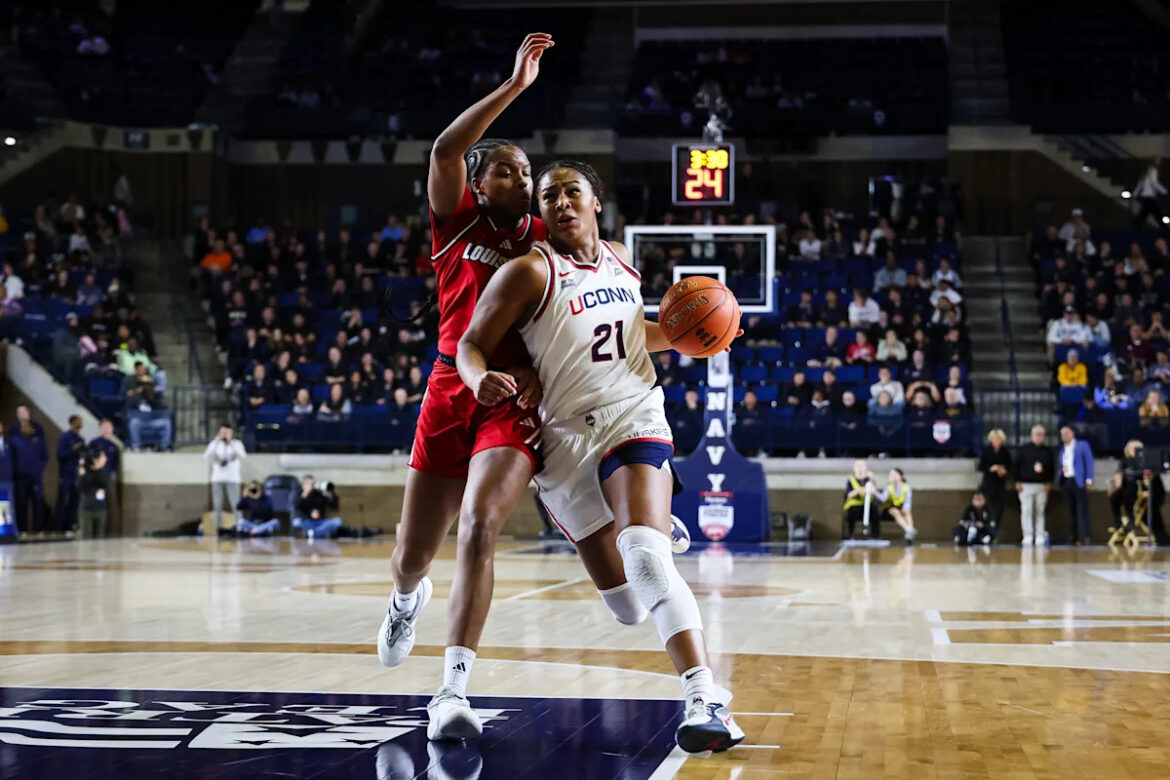The championship defense is off to a rollicking start.
No. 1 Connecticut needed every point of its monster first quarter to open the season with a 79-66 win over No. 20 Louisville in the Peraton Armed Forces Classic on Tuesday. The Huskies carried over their Final Four domination in a 25-9 first quarter that gave way to a tighter contest in the third AP Top 25 matchup of the young season.
Advertisement
Sarah Strong led all scorers with 21 points, Azzi Fudd added 20 and USC transfer Kayleigh Heckel chipped in 14 off the bench. Connecticut led by as many as 28 points midway through the third, but Louisville made it a 10-point deficit in the final minutes. They won the fourth, 26-18, led by Laura Ziegler’s nine points. She led the Cardinals with a 16-point, 18-rebound double-double.
The game was played at the United States Naval Academy in Annapolis, Maryland, after it was moved from Germany. UConn is trying to become the first program to repeat as NCAA Division I champions since the four consecutive titles it won with Breanna Stewart from 2013-16.
Sarah Strong clear NPOY contender
Strong scored in all sorts of fashions to begin her sophomore year, showcasing why she’s a top contender for National Player of the Year. The 6-foot-2 forward worked Louisville in the post, hit baby hooks and led the break time and again. Her work in the paint led UConn to a 50-18 advantage against an overmatched Cardinals roster. When the defense sent a double, she passed out for quick buckets from guards.
Advertisement
Strong will pour in points, especially in Big East play, but it’s the way she impacts every part of the box score that will lift trophy chances for both herself and the Huskies. She had nine rebounds and five assists, both team highs, plus two blocks and two steals. Her versatility gives head coach Geno Auriemma even more to work with on a deeper team than last year’s national title winner.
KK Arnold commands the offense
Arnold started 33 games as a freshman out of necessity due to the litany of injuries, but moved back to the bench for all 40 games of the championship run. The 5-9 junior guard learned for two years behind Husky point guards Nika Mühl, Paige Bueckers and Kaitlyn Chen.
“It’s her time to run the team,” Bueckers said on the ESPN broadcast in an interview with Holly Rowe.
Advertisement
She did it well, answering at least for the first night if she could handle the responsibility. UConn needs an offensive leader who can keep the ball popping, as well as a consistent third threat beyond the duo of Strong and Fudd. Her pace and vision to find teammates in transition kept UConn on a furious attack with which Louisville’s defense couldn’t compete.
Arnold led all scorers in the first half with 13 points thanks to an efficiency that surely made Bueckers proud. She was 6-of-9, hitting all four of her attempts in the deciding first quarter. Her baseline-to-baseline drive and a pretty pivot move around the defender on the ensuing possession put UConn up, 14-1, minutes into the game. As Strong began drawing more attention, she set up in the corner to drain 3s on the sprays.
Arnold was 6-of-10, including 1-of-3 on 3-pointers. She could have added another, but toe-tapped the line on the shot. She added 7 rebounds, 3 steals and 2 assists. Fudd took a team-high 20 attempts, hitting nine and shooting 2-of-8 from the perimeter (UConn shot 4-of-26 as a team). The senior guard was a team-high plus-20.
Advertisement
ESPN debuts rules analyst
In the first game of the season for ESPN’s lead women’s basketball crew, the network introduced the on-site addition of rules analyst Dee Kantner. And they went to the former referee early when Louisville head coach Jeff Walz appealed an out-of-bounds call.
The new rule allows coaches to appeal certain changeable plays at any point during the game, including backcourt violations, if a foul was assessed to the correct player and if free throws should be awarded. Teams that lose an appeal are docked a timeout, and coaches can appeal as many times as they want as long as they have a timeout. If they do not have a timeout, an excessive timeout will be called and a technical assessed.
Rules analysts are commonplace for most leagues and the majority of networks, especially in big games. It’s a welcome and long-overdue addition for women’s basketball as interest climbs, and while officiating remains a controversial topic in the WNBA.
